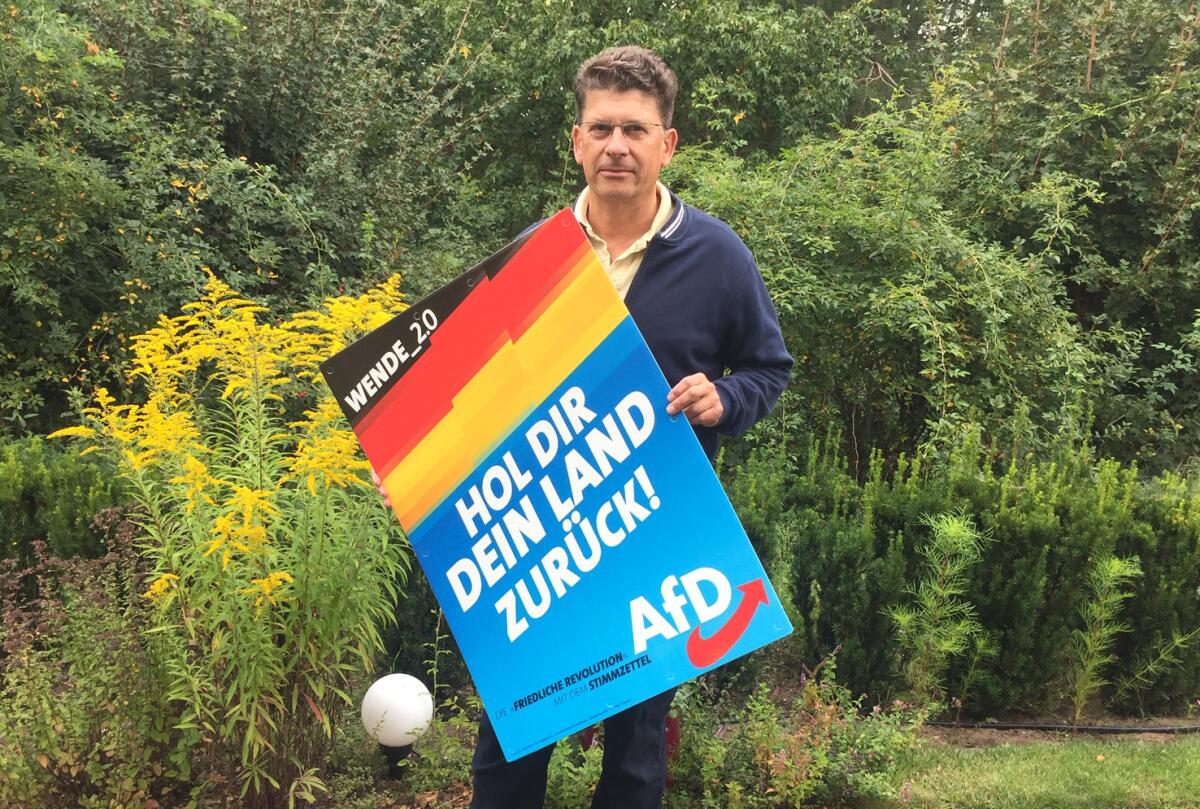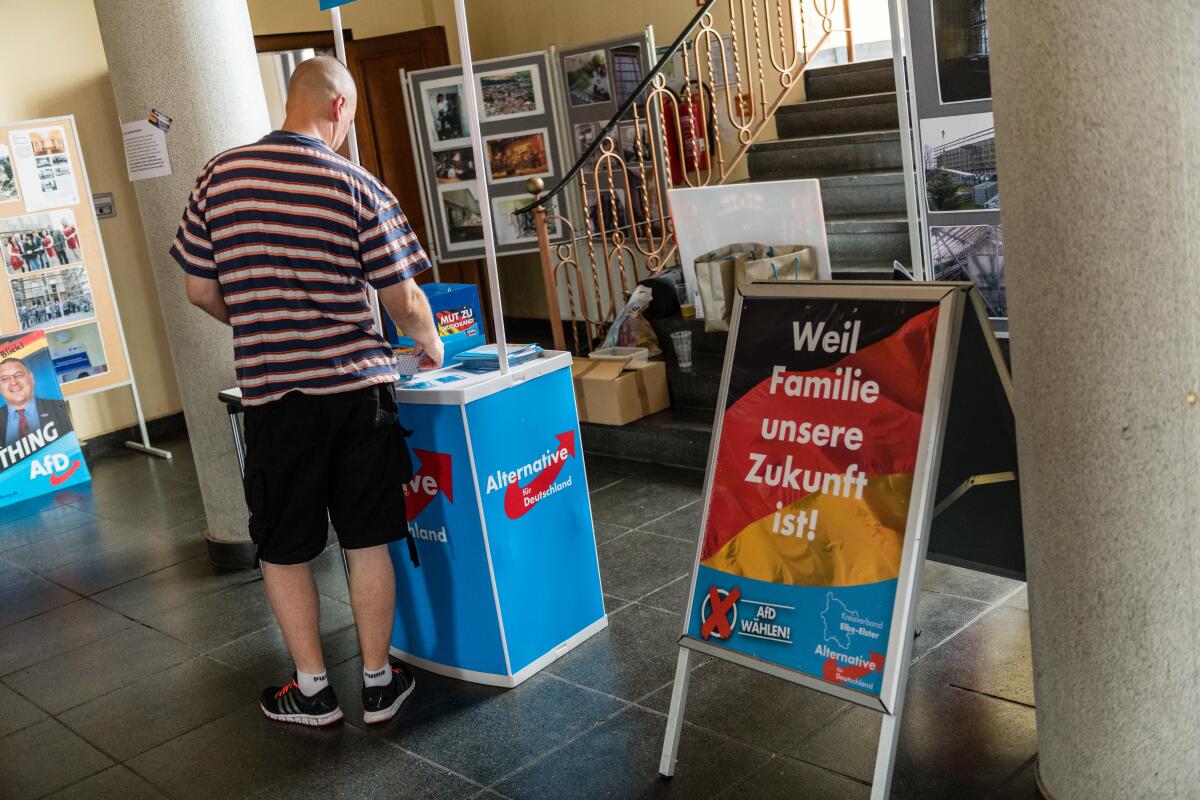Violence by refugees and far-right extremists is darkening political attitudes in Germany

- Share via
POTSDAM, Germany — For adamantly insisting there are too many foreigners in Germany from radically different cultures collecting state welfare benefits, Joerg Quitt has lost friends — Germans who believe their country has a duty rooted in its history to open its arms to all refugees.
But the xenophobic Alternative for Germany (AfD) party that the 58-year-old engineer has unabashedly supported since it was founded in 2013 could prove the big winner in two upcoming state elections. Opinion polls show the far-right populists on track to win the largest share of the votes in Quitt’s state of Brandenburg as well as in Saxony — two states in the formerly communist east.
If they do, they would almost surely not rule either state because other parties have refused to form coalitions with AfD. Nonetheless, the results could tarnish the image of the states abroad and cause political turbulence within Germany.
“We’re being overrun by foreigners, and once they’re here, they won’t ever leave,” said Quitt, who moved to the east after German unification in 1990 and is looking forward to the Sept. 1 vote. He is hoping the AfD will trounce Chancellor Angela Merkel’s Christian Democratic Union and all other parties for the first time in any state elections — mainly on the strength of its rigid anti-refugee stand.
“Many of the refugees we’re spending all this money on don’t even like us,” added Quitt, who lives in a suburb near the Brandenburg state capital of Potsdam. “We’re going to end up being a minority in our own country. It’s a joke. The established parties just ignore the whole problem, and they’re going to pay a price for that.”
The mood in Germany has been darkened this summer by a series of violent episodes blamed on refugees who fled to Germany and Europe and on right-wing extremists angered by the flow of 1.5 million refugees into Germany since 2015.

Though the four incidents took place in western German states, the turmoil has contributed to support for the far-right AfD going into the state elections, according to analysts and political leaders. The AfD is expected to win 21% to 23% of the vote, recent opinion polls have showed.
“There’s a lot of tension in the air at the moment,” said Hajo Funke, an author and political scientist in Berlin who studied the tactics of the far right for his latest book, “The Struggle for Memory.” “It’s an explosive situation. The AfD is clearly trying to use these horrid killings to whip up sentiment against ethnic groups in general and minorities in particular in Germany.”
An 8-year-old German boy was killed at the Frankfurt train station on July 29, allegedly by a 40-year-old Eritrean refugee who shoved the boy from the platform to his death in front of a train as it rolled into the crowded station. The assailant also pushed the boy’s mother onto the tracks, but she survived. Two days later, a man was stabbed to death with a samurai sword in broad daylight in Stuttgart, allegedly by his former roommate — a foreigner seeking asylum.
Police said the German citizen killed with the sword had threatened to inform authorities that the former roommate was not, as he had claimed, a Syrian war refugee, but was from Jordan and came to Germany with a fake Syrian passport. Images of the attack were widely circulated on the internet.
In late spring came a killing that was attributed to right-wing violence. On June 2, a prominent local political leader in Merkel’s conservative party, Walter Luebcke, was shot in the head at close range; the suspect is described as a far-right extremist. State prosecutors have said they believe Luebcke was killed because of his staunch support over the years for Merkel’s pro-refugee policies.
On July 23, an Eritrean man was seriously wounded in a drive-by shooting in the town of Waechtersbach. Police said the gunman, a 55-year-old German who later shot himself in the head, apparently picked out the victim because of his skin color.
“A lot of people in eastern Germany are looking for someone to blame for their own difficult and frustrating situation — and foreigners have become a target,” said Michael Luehmann, a political scientist who has studied the issue at the Goettingen Institute for Democracy.
“There’s a feeling that the refugees are being handed everything by the state while many East Germans struggling to get by are not getting enough help. It’s an absurd claim. But the refugees are easy to blame. The AfD is trying to ride that wave of disenchantment to the polls,” Luehmann said, adding that a strong showing at the ballot box could frighten foreign investors and students.
Despite the turbulence in the east, many Germans still wholeheartedly support the Willkommenskultur, or culture of welcoming, that accompanied the arrival in 2015 of large numbers of refugees from war-torn Syria, Iraq, Afghanistan and parts of Africa. The federal government spent $26 billion last year to help integrate more than 1 million refugees, and the total bill is expected to top $100 billion.
“There are unfortunately areas in Brandenburg and Saxony that are not very friendly towards foreigners,” said Firas Zakri, a former English teacher from Aleppo, Syria, who came to Germany as a refugee in 2015 and is training in Berlin to become a software engineer. “The AfD relies on hate and ignorance to win votes. You can feel the rising support for the AfD and their views in those states.”
Barbara Richstein, a member of the Brandenburg state assembly for Merkel’s center-right party, is nevertheless confident she can win her constituency in Falkensee just west of Berlin. It’s important to try to understand the AfD’s supporters, she said, in order to win them back.
“We’re living in a complex world, but some people are looking for simple answers,” she said in an interview. “It’s a mistake to assume that AfD supporters are only the poor and disenfranchised. They come from all walks of life. They’re generally afraid of everything changing around them, and they’re afraid their living standards will deteriorate.”










